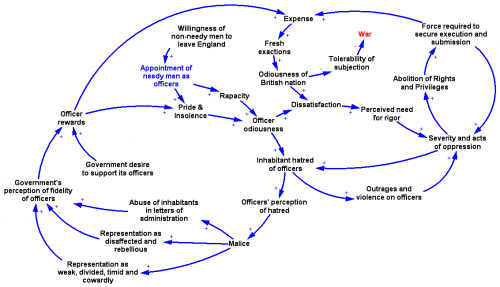I find that many great thinkers are systems thinkers, even if they don’t use the lingo of feedback. Here’s a great example, in which Ben Franklin anticipates the American revolution, describing forces that could bring it about:
TO THE COMMITTEE OF CORRESPONDENCE IN MASSACHUSETTS
London, May 15, 1771.
GENTLEMEN,
I have received your favour of the 27th of February, with the journal of the House of Representatives, and copies of the late oppressive prosecutions in the Admiralty Court, which I shall, as you direct, communicate to Mr. Bollan, and consult with him on the most advantageous use to be made of them for the interest of the province.
I think one may clearly see, in the system of customs [import taxes] to be exacted in America by act of Parliament, the seeds sown of a total disunion of the two countries, though, as yet, that event may be at a considerable distance. The course and natural progress seems to be, first, the appointment of needy men as officers, for others do not care to leave England; then, their necessities make them rapacious, their office makes them proud and insolent, their insolence and rapacity make them odious, and, being conscious that they are hated, they become malicious; their malice urges them to a continual abuse of the inhabitants in their letters to administration, representing them as disaffected and rebellious, and (to encourage the use of severity) as weak, divided, timid, and cowardly. Government believes all; thinks it necessary to support and countenance its officers; their quarrelling with the people is deemed a mark and consequence of their fidelity; they are therefore more highly rewarded, and this makes their conduct still more insolent and provoking.
The resentment of the people will, at times and on particular incidents, burst into outrages and violence upon such officers, and this naturally draws down severity and acts of further oppression from hence. The more the people are dissatisfied, the more rigor will be thought necessary; severe punishments will be inflicted to terrify; rights and privileges will be abolished; greater force will then be required to secure execution and submission; the expense will become enormous; it will then be thought proper, by fresh exactions, to make the people defray it; thence, the British nation and government will become odious, the subjection to it will be deemed no longer tolerable; war ensues, and the bloody struggle will end in absolute slavery to America, or ruin to Britain by the loss of her colonies; the latter most probable, from America’s growing strength and magnitude.
….
I do not pretend to the gift of prophecy. History shows, that, by these steps, great empires have crumbled heretofore; and the late transactions we have so much cause to complain of show, that we are in the same train, and that, without a greater share of prudence and wisdom, than we have seen both sides to be possessed of, we shall probably come to the same conclusion….
With great esteem and respect, I have the honour to be, &c.
B. FRANKLIN.
This translates readily into a rich causal loop diagram (click the image to enlarge):
My CLD here is basically a direct translation of the letter. That makes it sound a little more like a cycle of events, and less like interaction of quantities that can vary, than I would like. I think it could be refined somewhat by aggregating related concepts and rearranging a few links. For example, war is really just an escalation of violence, so one could simplify by treating the level of violence more generically.
The interesting thing about this diagram is that it’s all positive loops. Presumably the “prudence and wisdom” that Franklin noted would have created negative loops that would have stabilized the situation. What were they?
I bet a lot of the same dynamics are in the DOD Afghanistan counterinsurgency diagram.
Thanks to Dan Proctor for the original letter & idea.
The Vensim CLD is here if you want to play: franklin.mdl

